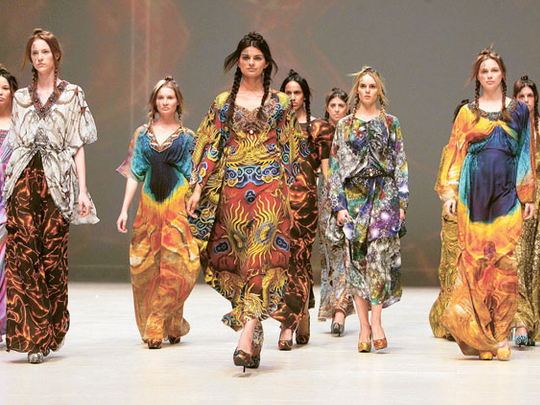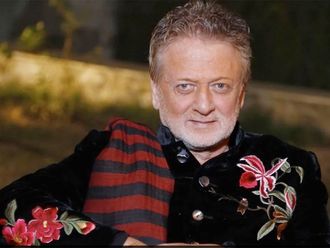
Social media is giving a voice to models who, for the most part, have built their careers as pretty, non-speaking faces.
They'll tweet what they had for breakfast, post behind-the-scenes photos on Tumblr and use Facebook to cultivate "friends" around the world. Tech-savvy fashion followers are eating it up, gaining entry to a world that is so often behind velvet ropes.
"I realised there was an audience interested in what I had to say, not just the images from my work," said model Coco Rocha, who alternates personal posts and lighthearted tidbits with a more businesslike platform to highlight brands and magazines she's shooting for as well as her favourite social and charitable causes.
At age 23, Rocha is no longer the new girl in town, but her fan base of more than 200,000 Twitter followers and 66,000 Facebook friends (plus Tumblr, Google+ and Instagram accounts and blog readers) gives her "longevity", she said. "Because I have a voice and I'm sticking to having that voice, I feel like I have extended my career."
Name recognition increases a model's value, said Sean Patterson, president of the Wilhelmina agency. Models who become celebrities, online or otherwise, might even help reverse the trend of movie and pop stars with "relatable" personal stories taking the A-list advertising jobs and magazine covers that used to go to models.
With the day of the supermodel over, models have become more "interchangeable and disposable", Patterson said. But social media may change that by letting models define themselves: "With fan sites, blogs and Facebook, all of a sudden you can follow a model and know who she is."
Models with online followings can also create extra buzz for brands they represent. "I imagine, for example, that Victoria's Secret likes that Doutzen [Kroes] has so many Twitter followers and that she tells them, ‘Watch the Victoria's Secret show I'm in at 9pm," Patterson said.
In addition, social media lets models show the interesting lives they lead off the runway, and it's a way for chatty, likable personalities to shine. That could tip the balance of who makes it big and who doesn't, said Michael Flutie, of the E! show Scouted.
"If you have 10 beautiful girls, all diamonds in the rough to be the next Christy Turlington or Cindy Crawford, you have to narrow it down somehow and you're going to narrow it down to the four who can communicate really well digitally," he said.
Flutie, a veteran agent and manager, added that being photogenic is no longer the only requirement: "If you can't walk and talk, you can't really be a successful ambassador of a brand. You have to be able to communicate."
Models should also know how to Google. There's no excuse for a model with thousands of cyber followers to not know the name of a company's CEO when she shows up to shoot its catalogue, Flutie said.
In the 1990s, Turlington, Crawford and their pals like Linda Evangelista, Kate Moss and Naomi Campbell were household names, but they didn't get to create their own personas the way Rocha or Kroes do today.
The public got to know those supermodels in gossip columns and paparazzi photos — this newer generation posts notes about their yoga poses.
"I started out doing all this as a fun thing by myself," said Kroes. "My big thing was how I could give back and how I could tell people I was involved in charity, but then I figured out how it all fits together: I realised I could build my own profile."
Liane Mullin, co-founder of Modelinia.com, an online industry hub, notes that models have a lot of credibility when it comes to posts about "fashion, beauty, fitness, nutrition and food".
"That's what they're experts in. If they recommend a mascara, they've had it put on them 10,000 times, and I've never worn that much mascara myself, then I trust her opinion."
Hearing about their everyday lives is icing on the cake, she said. "When you see who their friends are, who they are getting congratulations from, who is sending birthday wishes, it's the popular group that you're watching from the sidelines that you always wanted to be a part of."
‘They're lonely'
Models also tend to be very active online once they start. "They're travelling all over the world, sometimes with people they don't know, and they're lonely at times. Social media keeps them company and connected," Mullins said.
Model Heide Lindgren wasn't sure about social media at first. She worried about alienating friends and family, fans or potential employers. But when she wanted to promote a pet cause, Models4Water, which supports clean drinking water efforts, doing it online was the best way. It put her in touch with people in the renewable energy industry, pet lovers and fashion fans. From there, she was hooked.
"You can make yourself into more than a model this way. It introduces me to a new audience, and it might be more people seeing my posts than something that's in Vogue," Lindgren said.
She mentions products occasionally, but not as paid endorsements. She's not sure pitchwoman is the online personality she wants: "I want it to be 100 per cent real."
Kroes said she's still trying to strike the right balance in presenting herself as new wife and mother, celebrity and do-gooder. Sometimes, she slips and sends something personal, not thinking about the thousands of people who might be reading her post.
"Sometimes it's scary. I can tweet and 160,000 can see what I'm doing or cooking at home. I forget that because I'm just doing it on my phone, but I'm always trying to reach people in a positive way so I don't think it's a bad thing."
Rocha is posting more than ever, but she's vowing to self-censor a little after tweeting last month from the US premiere of Iron Lady that she was excited to see Glenn Close. The movie stars Meryl Streep.
"People tweeted back right away: ‘dumb model', but it was A LOT of people," she said.
"When I started, models were booked only for their cheekbones. Now I think I get bookings because people will say they respect me, or we stand for the same things, or they think what I have to say is interesting. It's better to hear that than just, ‘You have gorgeous cheekbone structure.'"








